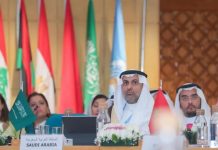DM Monitoring
BAKU: Diplomatic contacts over the post-conflict process between Azerbaijan and Armenia and the implementation of the recently signed cease-fire deal in the Nagorno-Karabakh region continue.
Armenian President Armen Sarkissian discussed the cease-fire recently signed with Azerbaijan during a short working visit to the United Arab Emirates (UAE) Sunday.
Sarkissian met with Abu Dhabi Crown Prince Mohammed bin Zayed al-Nahyan, the UAE’s official news agency WAM reported.
Regional issues and developments in Central Asia and the Caucasus were also discussed in addition to improving relations between the two countries.
Al-Nahyan said his country welcomes the cease-fire agreement between Azerbaijan and Armenia and hopes it will foster lasting peace and security.
Separately, the foreign ministers of Azerbaijan and Russia on Sunday discussed the situation in Nagorno-Karabakh in a phone call, the Russian Foreign Ministry said. Azerbaijani Foreign Minister Jeyhun Bayramov and his Russian counterpart Sergey Lavrov talked about post-conflict reconstruction, humanitarian issues and the need for active participation of international organizations to protect the religious and cultural heritage in the region, the ministry said in a statement.
Most recently, Azerbaijan on Sunday postponed taking control of a territory ceded by Armenian forces in a cease-fire agreement, but denounced civilians leaving the area for burning houses and committing what it called “ecological terror.”
The cease-fire ended six weeks of intense fighting between Azerbaijan and Armenia over the Nagorno-Karabakh region and territories outside its formal borders that had been under the occupation of Armenian forces since 1994. The agreement calls for Azerbaijan to take control of the outlying territories. The first, Kalbajar, was to be turned over Sunday.
But Azerbaijan agreed to delay the takeover until Nov. 25 after a request from Armenia. Azerbaijani presidential aide Hikmet Hajiyev said worsening weather conditions made the withdrawal of Armenian forces and civilians difficult along the single road through the mountainous territory that connects Kalbajar with Armenia.
After the agreement was announced early Tuesday, many distraught residents preparing to evacuate set their houses ablaze to make them unusable for Azerbaijanis who would move in.
“Armenians are damaging the environment and civilian objects. Environmental damage, ecological terror must be prevented,” Hajiyev said.
Prior to a separatist war that ended in 1994, Kalbajar was populated almost exclusively by Azerbaijanis. But the territory then came under Armenian control, and Armenians moved in. Azerbaijan deemed their presence illegal. “The placement and settlement of the Armenian population in the occupied territory of the Kalbajar region was illegal … All illegal settlements there must be evicted,” Hajiyev said.
The imminent renewal of Azerbaijani control raised wide concerns about the fate of Armenian cultural and religious sites, particularly Dadivank, a noted Armenian Apostolic Church monastery that dates back to the ninth century.
Azerbaijani President Ilham Aliyev assured Russian President Vladimir Putin, who negotiated the cease-fire and is sending about 2,000 peacekeeping troops, that Christian churches would be protected.






